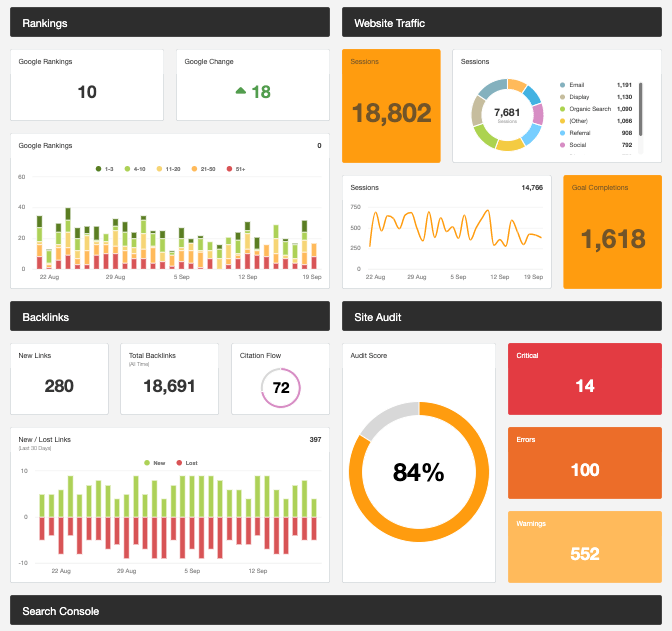How Do I Get My Website Found on Google: A Step-by-Step Guide
Share article
Have you ever wondered, “how do I get my website found on Google?” It’s no magic trick; it’s an art and science of optimizing your website for search engines, combined with leveraging the right tools and strategies. This step-by-step guide will walk you through the process of getting your website found on Google and improving its search ranking, so you can reach a wider audience and grow your online presence.
Short Summary
- Register your website with Google Search Console and submit a sitemap to get indexed by Google.
- Optimize your website for SEO using keyword research, on-page optimization, off-page optimization strategies and leverage Google My Business.
- Enhance user experience through mobile friendly design and fast loading times. Utilize social media & content marketing. Monitor progress with analytics tools to refine strategies for improved visibility & conversions.
Get Indexed by Google

Before you can rank high on Google, your website needs to be indexed by the search engine. In simpler terms, Google needs to know your site exists and what it’s all about, so it can include your web pages in relevant search results. But how do you ensure your website gets indexed? It starts with two crucial steps: registering your site with Google Search Console and submitting a sitemap. These actions will help Google discover and efficiently crawl your site, making it more likely to appear in search results.
Think of Google as a constantly evolving library with an infinitely expanding book collection. In this scenario, your website is a book that needs to be added to the library. Registering with Google Search Console and submitting a sitemap are like handing your book to the librarian (Google), ensuring it gets placed on the right shelf for potential readers (users) to find.
Register with Google Search Console
Google Search Console is a powerful and free tool designed to help you diagnose indexation errors and improve your website’s visibility in Google’s search results. Registering your site with Google Search Console is essential for SEO, as it’s typically the most efficient way to get your site indexed by Google’s search engine and enhance its presence in the google search results, as well as in other search engines.
To ensure you get your website indexed, verify ownership of the site within Google Search Console and submit a sitemap, including existing pages. By registering with Google Search Console, you’re essentially introducing your website to Google and giving it a chance to be discovered and included in relevant search results.
Submit a Sitemap
A sitemap is a file that helps Google discover and index your site’s pages more effectively, ultimately increasing the chances of your website being found on Google. Submitting a sitemap to Google involves selecting the “submit a sitemap” option in Google Search Console, which can improve your website’s position in search engine results.
Submitting an updated sitemap can be particularly beneficial when launching a new website or adding new pages to an existing domain. Log in to Google Search Console and select ‘Add a Property’. Subsequently, submit the updated sitemap to Google. This simple action helps. Google better understands your site’s structure and efficiently crawls and indexes its pages.
Optimize Your Website for SEO

Keyword research is the process of identifying the most suitable ‘target keywords’ for your website. These are the words and phrases that your potential customers are likely to use when searching for information, products, or services related to your business on search engines. The goal is to find the SEO ‘sweet spot’: keywords that are popular enough to yield a considerable amount of traffic, yet not so popular that other websites are already dominating the search results for a particular search query.
Long tail keywords, those with more than 3-4 words, are particularly valuable due to their specificity and lower search volume. By conducting in-depth keyword research, you can identify high-volume, relevant keywords to integrate into your website’s pages, enhancing your search visibility and attracting more visitors.
On-Page Optimization
On-page optimization, also known as on-page SEO, involves taking measures directly within the website to improve its position in the search rankings. These measures include optimizing content, improving meta descriptions and title tags, and incorporating target keywords in headings, page titles, URLs, and crafting a compelling meta description.
To effectively incorporate target keywords into your website, it’s crucial to ensure that they’re relevant to the content of the page and used in a natural manner. This not only helps but also helps. Google understands the relevance of your content to specific queries, but also makes your website more appealing and informative to users, increasing the likelihood of appearing on Google’s first page for a given query.
Off-Page Optimization
Off-page optimization focuses on actions taken outside of your website that can improve its search ranking. One of the most important aspects of off-page optimization is building high-quality backlinks. These are links from other sites to your site, and Google considers them as validation of your content.
When generating backlinks, it’s essential to avoid using companies that promise to create thousands of low-quality backlinks or engaging in excessive link swapping or ‘link schemes’. Instead, focus on creating high-quality content that naturally attracts backlinks and collaborates with reputable websites within your industry.
This approach will not only improve your website’s search ranking, but also boost its credibility and trustworthiness among users.
Leverage Google My Business

Google My Business is a service that enables businesses to create a Google Business Profile and appear in applicable geographic search results, making it an essential tool for local SEO. By establishing a Google My Business account, you’re effectively telling Google that your business is a reliable outcome to present to users searching for businesses like yours in a specific location. Utilizing Google Analytics. Ads can further enhance your online presence and visibility in search results, and integrating Google Maps can help customers easily locate your business.
In this section, we’ll explore how to create and optimize your Google My Business profile, as well as encourage customer reviews. These steps will help you boost your online reputation and improve your website’s visibility in local search results.
Create and Optimize Your Profile
Setting up a Google My Business profile is a simple process that can significantly enhance your local SEO efforts. To create and optimize your profile, include essential details such as your business name, address, phone number, website, hours of operation, and location.
Ensuring that all information provided is accurate and up-to-date is crucial for optimizing your profile. This not only helps but also helps. Google understands your business better, but also makes it easier for potential customers to find and contact you, ultimately leading to increased visibility and a higher search ranking.
Encourage Customer Reviews
Customer reviews play a significant role in your online reputation and search ranking. Quantity and quality of reviews can affect your website’s ranking on Google and other directories. To encourage customers to leave reviews on your Google My Business profile, focus on delivering excellent products or services and actively request feedback from satisfied customers.
Positive reviews not only improve your search ranking but also help build trust among potential customers. By showcasing genuine experiences and opinions from real users, you’re giving prospective clients a reason to choose your business over competitors.
Enhance Your Website's User Experience

User experience is a critical factor in your website’s search ranking, as Google rewards sites that offer a seamless and enjoyable experience to visitors. In this section, we’ll discuss two essential aspects of user experience: mobile-friendly design and fast loading times. By focusing on these elements, you’ll improve your site’s ranking in mobile search results and cater to the growing number of mobile users.
Remember that a great user experience not only benefits your search ranking but also helps retain visitors and convert them into customers. A website that’s easy to navigate, visually appealing, and informative is more likely to keep users engaged and encourage them to explore other pages or make a purchase. Ensuring each web page follows these principles will contribute to a positive user experience.
Mobile-Friendly Design
A mobile-friendly design is a website design optimized for viewing on mobile devices such as smartphones and tablets. This involves ensuring the website is intuitive to navigate, loads promptly, and is aesthetically pleasing on smaller screens. Google considers the mobile-friendliness of a site when determining which pages to prioritize in the search results. Therefore, having a mobile-friendly design is not only essential for user experience but also for SEO.
To implement a mobile-friendly design, focus on minimizing the number of queries posed to visitors on a smaller display and providing a speedy, useful answer to users’ issues. By offering a seamless experience on mobile devices, you’ll cater to a broader audience, improve your search ranking, and ultimately increase your website’s visibility on Google.
Fast Loading Times
Fast loading times are crucial for an enjoyable user experience and search ranking. Websites that load quickly on both desktop and mobile devices are more likely to retain visitors and rank higher in search results. In fact, sluggish loading times can cause up to 29% of smartphone users to instantly move to another website if they’re not satisfied with your site’s performance.
To optimize your site for fast loading times, select a reliable hosting provider, optimize images and other elements on the page, minimize redirects, and enable browser caching. By focusing on these aspects, you’ll not only improve user satisfaction, but also avoid penalties from Google and boost your search ranking.
Utilize Social Media and Content Marketing

Social media and content marketing are powerful tools that can help increase your website’s visibility and reach a wider audience. By sharing engaging content on popular platforms such as Facebook, Twitter, Instagram, and LinkedIn, you can attract more visitors to your site and improve your search ranking.
Remember that social media and content marketing are not just about promoting your products or services; they’re also about building a community, engaging with your audience, and establishing your brand as a trusted source of information. By focusing on these aspects, you’ll not only enhance your website’s search ranking, but also create lasting connections with your target audience.
Share Engaging Content
Content marketing is a strategic approach that involves creating and sharing valuable, relevant, and consistent content to attract and retain a clearly defined audience. Examples of content marketing include blog articles, videos, podcasts, and social media posts. To create engaging content, gain an understanding of your target audience and their needs, and research topics that are relevant to them.
Sharing content on social media is an effective way to extend your reach and enhance your website’s visibility. Platforms such as Facebook, Twitter, Instagram, and LinkedIn can be utilized to share your content. Ensure that your content is optimized for each platform and that you’re actively engaging with your followers. This will not only attract more visitors to your site, but also improve your search ranking.
Collaborate with Influencers
Influencer marketing is a strategic collaboration between popular social media users and brands to promote the brand’s products or services. It’s an effective way to spread digital word-of-mouth and has become a widely-used form of online marketing. To identify influencers in your industry, research relevant social media accounts, explore industry-specific hashtags, and use influencer marketing platforms.
When developing content with influencers, ensure it’s pertinent to your brand and resonates with your intended audience. By collaborating with influencers, you can gain exposure, build credibility, and reach a wider audience, ultimately improving your website’s search ranking and visibility on Google.
Monitor and Analyze Your Progress

Monitoring and analyzing your progress is essential for maintaining and improving your website’s search ranking. By using tools like Google Analytics, you can track your website’s performance, recognize areas that need improvement, and measure the success of your SEO strategies.
In this section, we’ll explore how to use Google Analytics to assess and evaluate your progress and adjust your approach as needed. Remember that SEO is an ongoing process, and you’ll need to continuously monitor your progress, analyze data, and adjust your approach to stay ahead of the competition and maintain high search rankings.
By staying informed and adapting your strategies, you’ll ensure your website remains visible and relevant to your target audience.
Google Analytics
Google Analytics is a comprehensive web analytics service that provides statistics and analytical tools for search engine optimization (SEO) and marketing purposes. By tracking metrics such as page views, bounce rate, time on page, and user engagement, Google Analytics can help you monitor your website’s performance and pinpoint areas for improvement.
To set up Google Analytics, create an account and add the tracking code to your website. Once you’ve set up Google Analytics, you can use its various tools and reports to assess and evaluate your website’s performance, identify opportunities for optimization, and adjust your SEO strategies accordingly.
Adjust and Refine Your Approach
Based on the data and insights gathered from Google Analytics, you can identify areas of improvement and adjust your approach to better meet your goals. This could include altering your website’s content, optimizing your website for SEO, exploiting other marketing channels, or launching a google ads campaign.
By continuously monitoring your progress and adapting your strategies, you’ll ensure your website remains visible and relevant to your target audience. This ongoing process will help you maintain and improve your search ranking, ultimately leading to increased traffic, more leads, and better conversions.
Summary
In conclusion, getting your website found on Google involves a combination of strategies, including getting indexed by Google, optimizing your website for SEO, leveraging Google My Business, enhancing user experience, utilizing social media and content marketing, and monitoring and analyzing your progress. By implementing these strategies and continuously refining your approach, you’ll improve your website’s search ranking and reach a wider audience, ultimately growing your online presence and achieving success in the digital world.
Questions? Have a project you're ready to launch?
Simply text our team at
(857) 256-1295 or send us a message!
Latest Articles




